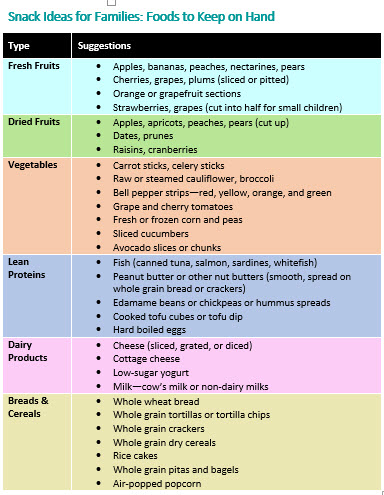While meals make up the majority of a child's nutritional intake, most children eat at least one snack per day. While many of the most commonly offered kids' snacks tend to be of lower nutritional value than meals, snacks still can support—or even enhance—your child's overall healthy eating plan. Here's how:
Use snack times as a way to increase fruits and vegetable intake. Most kids do not eat the
recommended amount of fruits and vegetables. Snack times offer a great opportunity to increase access and exposure to these nutrient-dense foods. Consider pairing them up with dairy products or dairy substitutes (such as grapes and cheese) lean proteins (such as celery and peanut butter), or whole-grain cereals and bread (such as banana sandwich on whole grain bread).
Keep a range of healthy foods handy at home. It is much easier to make easy, healthy snacks when you keep a few key items stocked at home. Ideas include different types of raw vegetables and fruit, yogurt dip, hummus, and cheese sticks.
Avoid processed foods and added sugars. Processed foods (made in a factory and sold in bags and boxes) do not have many nutrients and often have a lot of added sugar and salt. In addition, children may become hungry faster after eating processed foods.
See Snacks & Sugary Foods in School: AAP Policy Explained for more information.
Teach your children to eat a rainbow of colors. Arrange your children's foods to show the beauty of fresh, brightly colored foods. Talk about the farms where food comes from and the farmers who help grow it.

Additional Information & Resources: